Since medical and recreational marijuana legalization has gained momentum, there has been more cannabis plant recalls in the past few years in states like Colorado, California, Michigan, and Florida due to health hazards from smoking moldy marijuana.
Cannabis plants can begin to grow mold in the growing, drying, or curing stages. It becomes more susceptible to decay when the environment is not stable, so it’s crucial to maintain correctly controlled humidity and air ventilation.
Too much moisture is dangerous when it comes to the risk of weed mold. As a cannabis consumer, it’s essential to be aware of the potential issues and be able to identify and prevent moldy weed and bud rot.
Cannabis Mold 101
Mold is not suitable for anyone’s immune system, but it may worsen in some individuals. Approximately one-quarter of the human population carries a specific gene that makes them more susceptible to developing mold illnesses.
Others who may be at increased risk for an adverse reaction if they smoke moldy weed include those with asthma, respiratory conditions, autoimmune disorders, chemical sensitivities, and other chronic medical conditions.
Types of Moldy Cannabis
The types of mold that grow on marijuana plants are:
- Powdery Mildew
- Botrytis (Grey Mold)
- Mucor
- Cladosporium
- Rhizopus
- Aspergillus
- Penicillium
Is mold on weed common?
Bud rot and mold are fairly common, especially with home growers due to a lack of ventilation and an excess of moisture. Mold is a fungus that thrives in moist and humid environments with little adequate air ventilation. It reproduces through tiny airborne spores.
Humans typically inhale or ingest small amounts of mold spores daily, which are not harmful to a healthy immune system. Once your cannabis contains mold spores, it is challenging to get rid of them. They can survive combustion when heated and even the decarb process in an oven.
Ways to Identify Moldy Cannabis
Here are some tips to identify the top six types of cannabis fungal infection so that you can avoid the health consequences of smoking moldy weed.
Bud Rot
It usually begins with fluffy white growth in the middle or on the sides of your buds. Botrytis is easy to see with the naked eye as the color changes, and it becomes a dry weed texture.
Powdery Mildew
In the early stages of powdery mildew, you can see small circles of white mold on the tops of stems and leaves. As the fungi progress, they will become denser, covering the buds in thick white powder.
Fusarium
Dark spots on the lower leaves will quickly turn the leaves a yellowish-brown color. Visual signs to look out for are leaves that have wilted but not entirely fallen off and droopy stems.
Aspergillus
Common mold is found both indoors and outside. Generally dark green-black, Aspergillus spores create a lung infection after being inhaled and can be found in the soil or cannabis buds.
Penicillium
Penicillium mold is predominantly found indoors. Its spores are typically light blueish-green and can ruin crops and harm humans and animals that have been inhaling mold.
Rhizopus
It produces a grayish-white coating on its spores and may infect humans with certain health conditions, such as when a person has a compromised immune system.
Can smoking moldy weed make you sick?
While smoking moldy weed may not kill you, it is still not recommended and could have potential adverse effects, especially for those with certain chronic conditions.
If you smoke moldy weed and are allergic, you could potentially experience the following mild effects:
- coughing
- nausea and vomiting
But, you could also end up with inflammation of your sinuses and lungs, with more severe symptoms like:
- sinus pain
- drainage
- congestion
- wheezing
- chest pain
Inhaling certain mold species can have severe health consequences for those with weakened immune systems or lung conditions. Some molds like Aspergillus, Mucor, and Cryptococcus can cause severe infections in the lungs, central nervous system, and brain for people with a medical condition related to the immune system.
How to Avoid Moldy Weed
- Buds should be stored properly in a cool, dry place but try not to refrigerate or freeze them. The ideal temperature for flower is just under 77°F.
- Remember to keep your weed in airtight containers, preferably with darker colored glass. Weed does have an expiration date of approximately six months to one year.
- The ideal humidity level in your storage containers should be between 59% to 63%. You can purchase disposable humidity packs at many dispensaries that can be placed inside your mason jar.
- Less airflow can lead to mold, so be sure to provide proper ventilation in the storage room.
- Moldy weed will have a distinct odor. Cannabis products that have been infected by mold will usually smell musty after closer examination. Exposing cannabis to a black light is a good way to see if there’s mold present so you can avoid smoking moldy weed.
Can cannabis be tested for mold?
Yes. There are two standard scientific technologies used to test and identify mold on cannabis plants. Plating-based technologies measure the number of growing mold organisms in a sample.
Scientists can also utilize DNA-based or polymerase chain reaction-based technology to identify the presence of mold DNA from a sample.
Can weed mold be reversed?
Unfortunately, you can not do much to reverse the presence of mold or bud rot. You may be able to salvage other areas of the plant if you notice it early; however, that would require carefully removing the moldy parts and hoping the rest of your cannabis plant can bounce back.
Therefore, the only authentic way to fix moldy marijuana is to prevent mold growth altogether, which would require proper storage in an airtight container, fresh air ventilation, and a controlled temperature.
How to Identify Mold on Cherry Cheesecake Weed Strain?
When looking to identify mold on a cherry cheesecake weed strain, be on the lookout for fuzzy, discolored spots or a musty smell. Inspect the buds closely for any signs of mold growth, and discard them if you suspect contamination. Proper storage and monitoring can help prevent mold on your cherry cheesecake weed strain.
7 Cannabis Strains that Prevent Mold Spores
If you have ever smoked moldy weed, you understand the importance of avoiding it at all costs when during and after you’ve harvested cannabis.
Below, we’ve included seven of the top mold-resistant strains so your cannabis trichomes can be tasty and mold-free.
Afghan Kush
Afghan Kush is a legendary landrace strain, which means it’s a natural strain grown on Earth before humans got involved in the cultivation process. It’s equal parts THC and CBD, providing a peaceful yet long-lasting high.
This medical cannabis is known for significantly improving muscle spasms and pain associated with the brain and nervous system. As with most landrace strains, it’s well-known marijuana for resisting mold. Throughout time, this particular strain has been perfected to make it better adapted to diverse climate conditions.
Thai Sativa
- OG Kush originated on the West Coast and was first grown in Florida
- It is a popular strain with 18 percent THC and zero CBD content
- It’s a cross between Chemdawg, Lemon Thai, and the Hindu Kush
- OG Kush is a balanced hybrid breed and an excellent strain
- The flavor is sweet citrus, while the aroma is piney with a strong diesel smell.
- It has an average of eight to nine weeks of flowering time indoors
- Its buds are resinous and resistant to mold and mildew
- OG Kush is used in helping treat stress, depression, anxiety, nausea, and appetite loss
- Users say it produces a euphoric, happy high leaving you carefree and hungry
Strawberry Cough
Strawberry Cough has unknown origins. It has 19 percent THC content and one percent CBD. It’s thought to be a combination of Haze and Strawberry Fields and is a potent Sativa strain that naturally resists mold and mildew. It has a skunky aroma and a hint of berry flavor and is one of the best strains to treat mental disorders, anxiety, and depression. The cerebral high provided by this weed will leave you feeling euphoric and energized.
Durban Poison
Durban Poison originated from Durban, South Africa, and is sold by Dutch Passion Seed Company. It has an impressive 19 percent THC and one percent CBD. Durban Poison is a pure Sativa, which makes excellent parent strains. It has an herbal flavor and aroma with hints of pine and sage. This strain has fat buds with many trichomes. Durban Poison is an excellent strain for edibles, promotes creative qualities, and provides better focus than many other strains.
Island Sweet Skunk
- Island Sweet Skunk was first bred at Federation Seed Company in Canada
- It has 18 percent THC and one percent CBD content
- It’s a cross between Skunk No. 1 and Sweet Pink Grapefruit
- It’s a popular classic Sativa strain
- It smells sweet and skunky with a slight grapefruit taste
- The average flowering time indoors is seven to eight weeks long
- It produces a high yield of mold-resistant buds
- It’s used to treat anxiety, inflammation, and muscle spasms
- It produces an uplifting, energetic, and creative high
Super Silver Haze
- Super Silver Haze is bred by Green House Seeds and won first place in the High Times Cannabis Cup several years in the late 1990s
- It has 20 percent THC and 1 percent CBD
- It’s a cross between Haze, Northern Lights, and Skunk
- This marijuana tastes of spicy citrus and smells herbal
- The outdoor flowering time is around 77 days, while indoors is 59 days
- Users say it treats nausea, appetite loss, depression, anxiety, stress, and pain
Blue Dream
- Blue Dream originated in California, on the West Coast
- It has 18 percent THC and low CBD
- It’s a cross of Blueberry and Haze
- Blue Dream is a Sativa dominant hybrid strain
- Flavor and aroma boast sweet berries
- It has an average of 65 days of flowering time
- This strain is used to treat nausea, depression, chronic pain
- Blue Dream produces a relaxing, body-high, and balanced cerebral stimulation
Need More Answers?
Leafy DOC’s healthcare consultants can answer your questions about any cannabis product and its potential benefits and risks. In many states, you can see a doctor online and obtain a medical cannabis card from your own home when convenient for you. Taking this step will help to ensure that your medical marijuana is regulated and safe from mold growth.

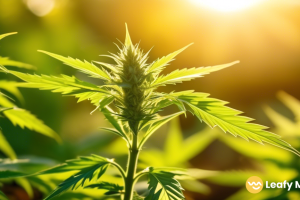
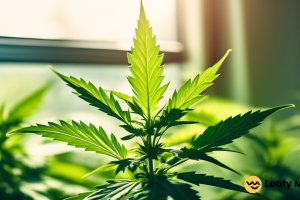
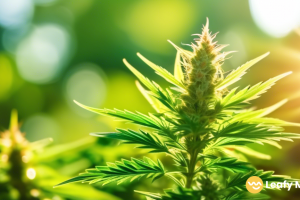




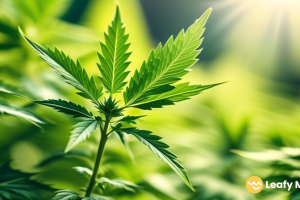
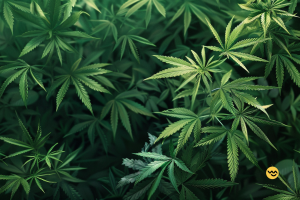
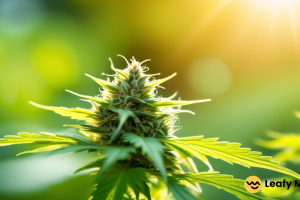
Leave a Reply